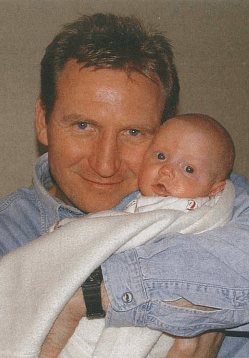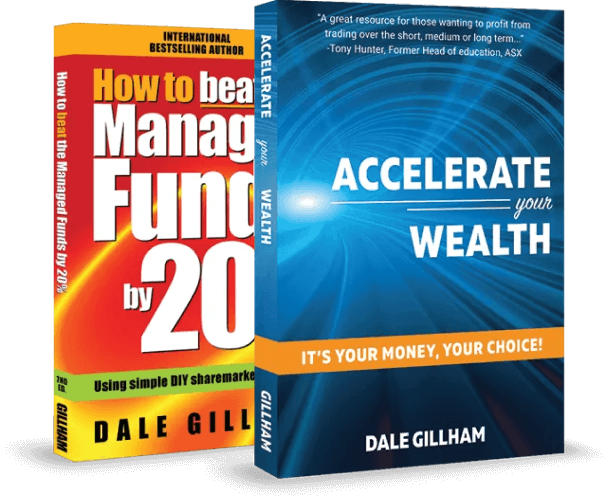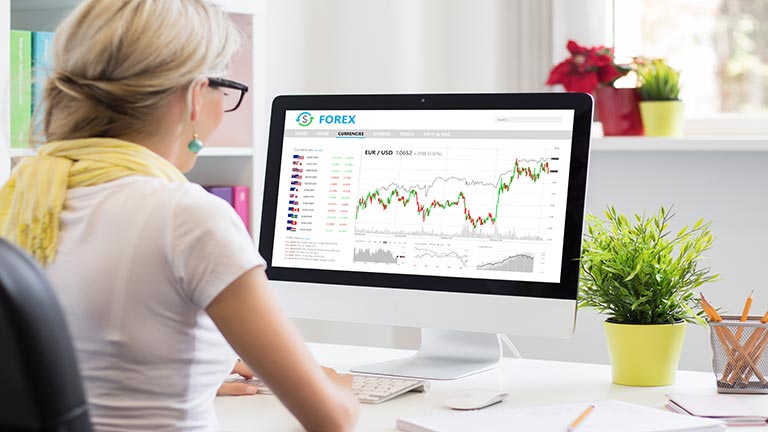Wealth Within Case Studies
Bob Boerbach
Bob Boerebach shares a review of what its like to study with Wealth Within. According to Bob, he wants to master his trading skills to the point where trading takes up minimal time, so he can spend more time with his family and watching his kids grow up.
Bob trades shares from his home in Wollongong on the south coast of New South Wales. After living and working overseas as an IT systems engineer for most of the 90's Bob, and his partner Jo, decided to settle down and start a family. They have two young daughters and enjoy the quality of life offered by living in a relaxed coastal environment. Bob’s interests include cycling, canyoning, bush walking, golf, gardening and teaching his eldest daughter to boogie board.

How and when did you first become interested in the markets?
I’d always treated the share market and trading with suspicion, with the idea that the only people who made money were those with ‘insider knowledge’. After I sold an investment property in the mid 90s I sought advice from a financial adviser as to what to do with the money in the short term, while I decided what to do with it long term. His advice was to invest into a managed fund – in particular with Colonial First State (as it was then). Two of the funds were the Imputation Fund and the Future Leaders Fund. Both invested in the ASX shares. Knowing very little about fund managers (having only invested in real estate), I put my faith in his advice and was nicely surprised by the excellent returns.
And then what happened?
Having taken six months off work after Lucy’s birth, my aim was to re-educate myself and then re-enter the workforce with new skills. The main impediment to this plan was that the only job vacancies were in Sydney – a three-hour commute each day from my home in Wollongong. So I began searching for a new means of generating an income, one that supported the lifestyle we hoped to achieve with our new family.
In 2005 a good friend recommended I read a book by Dale Gillham called ‘How to Beat the Managed Funds by 20%’. The book was a revelation. It clearly outlined the different principles employed by fund managers and technical traders and also cleared up some of the myths that had been holding me back as an investor for many years. I experienced what some would call an ‘Aha’ moment, along the lines that if I was getting great returns indirectly from the stock market via my fund manager, with some education and guidance, I could trade the stock market independently, with the aim of beating those returns by 20 per cent, which would provide me with the income source for which I’d been searching.
How have you been able to learn and educate yourself about the markets?
After reading Dale’s book I enrolled in the Mentor Program with Wealth Within. In early 2006, I started the Wealth Within Diploma of Share Trading and Investment and then the Advanced Trading Strategies Course. The teaching methods employed in the course and the ongoing support provided me with great preparation to be a skilled technical analyst and trader. I have continued to work with the Wealth Within team via their Trading Support as I develop as a trader.
I also got book hungry and read everything I could get my hands on – I highly recommend ‘Trading in the Zone’ by Mark Douglas, which is a great supplement to the main lesson that all traders need to learn – that it’s all in your head. As we learn in the course, trading is 20 per cent knowledge and 80 per cent psychology.
Did you make mistakes when starting out?
Yes, lots and lots. But I was able to learn something from each. Like a bull at a gate, I had started trading straight away, getting my hands dirty applying my newfound knowledge from the course, I over-traded. I fell in love with my analysis and traded beyond my means. Looking back though – the biggest mistake was obsessively watching the market. People will advise against this; but I think it’s a hard lesson to learn until you’ve gone through it and realize what a detrimental affect it can have.
Would you define yourself as a discretionary trader, a mechanical trader or a combination of both?
I’d say a combination of both. The Wealth Within courses taught me a wide range of technical trading skills – Dow, Gann, trend and others. The way the course is structured allows the student to be confident in applying the rules. But what was emphasized towards the end of the course was that we would eventually find our own style within the spectrum from truly mechanical to discretionary, or the ‘Art of Trading’ as Wealth Within calls it. I don’t see myself ever being a purely mechanical trader and I’m still working on how much discretion I include in the mix.
Who have been some of your mentors and role models? What impact have these people made on you personally as well as on your trading style?
People who have guided me on my trading journey have been the analysts at Wealth Within – Dale Gillham, Janine Cox and David Harvey.These guys have been brilliant. Their aim is to make share trading available to everyone and they bend over backwards to guide you to becoming a proficient trader. At the same time, there’s no spoon-feeding. Everybody needs to find their own pace and style. With this approach I have made a number of major fundamental shifts that have enabled me to grow as a trader.
Can you give us a brief overview of your trading style?
I’m not sure there’s a word to describe my trading style. Earlier, I would have described it as erratic; but over the last 12 to 15 months it has become more disciplined. As the Global Financial Crisis unfolded, I could see that if I were to be able to trade in all market conditions, discipline in employing a trading system would be essential to achieving any consistent success. I say ‘erratic initially’ because I traded anything and everything – I would search through stacks of charts searching for something that ‘looked good’. I eventually learnt that if I didn’t develop some focus I could spend the rest of my days looking for the magic stock that was going to deliver the golden egg.
One of the major shifts I experienced was when I finally whittled the 30 or so stocks I was trading down to around 12.I felt more relaxed about my trading straight away. My stock selection, I suppose is one of a discretionary nature. Fundamentals play a small part, but essentially I select on a chart’s form. I use Elliott Wave in my analysis and I tend to learn more about stocks with a clearly defined wave count. For a time last year there were many consolidation patterns forming, so at that stage I was selecting stocks on the basis of trading breakouts.
Something else that adds confidence in trading a stock is when I see clearly defined price levels that have provided support and resistance in the past, as they can provide an indication of where price may turn in the future. All trades are determined with the use of monthly, weekly, and daily charts.
The monthly chart provides a top-level picture of the stock. It shows long-term trend and, from an Elliott Wave perspective, whether it’s currently going through an impulsive or corrective phase. The weekly chart shows the medium-term trend. A strong rule is to trade only in the direction of that trend. The daily chart is used to fine tune entries and exits and for this I use a combination of Gann, Dow, trend lines and/or reverse signals.
Is there any one trade (win or loss) that sticks in your mind that had a profound effect on your development as a trader? If so, what did you learn from that trade?
Very early in my training, when I had just learnt Dow and Gann signals, I went searching through a heap of charts for a stock that may have just formed a Gann or Dow entry. I found one in Minara and without further ado I was in. Very quickly the trade hit 100 per cent profit, and in quiet celebration I exited the trade just to be able to mark the milestone. It taught me about the potential to trade the market using the most basic trading rules, without needing to use massively complex rules.
Another lesson was taught me by Roc Oil, some time later, when I was further into my training. Before entering the trade I had spent hours analyzing and back-testing and I was sure that it would reach the target I had determined. Unfortunately, it didn’t; and I held out for much longer than I should have as price moved against me. I reset and ignored a number of stop losses and finally exited with quite a loss after it traded through a significant price level. It taught me not to fall in love with my analysis and that Roc Oil owed me nothing – even if I had spent many hours analyzing it.
Can you tell us about your best and worst trades?
For me, as a technical trader, ‘best’ could refer either to the amount of profit made or to whether the analysis and application of a plan all comes together.The most satisfying trade I’ve had since trading full-time has to be Healthscope, where I traded on a breakout last year. I was able to set it up with a low-risk entry and, after having to take a few deep breaths along the way, I eventually exited when it turned $0.02 above the target price. An added bonus to the trade was the capital raising I was eligible for, which effectively helped double my returns on the trade. Of course, for sheer profit I have to mention the 100 per cent return on Minara very early on.
The worst would be the Roc Oil trade. Worst for being pig-headed with my analysis, not applying the stop losses; and the worst for losses experienced when I finally did exit. Would you classify yourself as a short-term or a long-term trader?
What advice would you offer to people getting started as traders on the relative merits or otherwise of each?
I’m a short to medium-term trader – my traders tend to be anywhere from three weeks to three months in duration. My main advice would be to get an education. I think it would also be beneficial to get some coaching once you start trading. Any education stream should ideally include an evaluation component that highlights the benefits of reviewing your goals, lifestyle, risk tolerance and available time. It is only when you’ve undertaken such a review that you’ll get an idea of whether you’d be suited to trading short term or long.
What markets do you trade and which do you prefer? Do you have a favourite, and why?
I have a Macquarie Prime account that allows me to make leveraged long and short trades on the ASX. I’m quite happy to have the ASX as my focus at the moment as these are only early days in my trading career and I want to refine my trading as much as possible before exploring other markets and products.
What makes your trading style different from others? What sets you apart from other traders?
I’m not really setting out to be different from other traders. My goal would be to be the same as other traders – successful ones of course. I want to be able to research what works best for the successful traders of the world, work out if these rules, tools and styles fit in with my character and then incorporate them into my trading plan after some evaluation and testing.
Do you have a favourite trading rule?
The rule I find really valuable was hammered home by the guys at Wealth Within Institute: ‘Trade on confirmation – not speculation’. It’s a rule that’s been hard to put into practice, but it is certainly valuable when applied. Another couple of useful rules are ‘Don’t overtrade’ and ‘Always trade with the prevailing trend’.
Ed Seykota says, “Everybody gets what the want from the markets.” What does Bob Boerebach get from the markets?
I suspect that maybe that statement is not entirely true. I have certainly received a good education from the market over the last five years. What I wanted from the markets by becoming a trader was flexibility – trading has certainly provided that.
After finishing work in IT, I needed an alternative source of income – I’m working towards providing that. I’ve been told I’m a left-brained individual and for 20 years I was able to put this to good use creating business system solutions. When I finished work and started a family it took me a while to realize I needed a replacement for this – trading fills that gap.
How has trading affected your lifestyle?
Trading is working towards allowing us to live the lifestyle we desire for our family. Trading allows me to work from home. It means I’m available for my family all the time. I don’t have to commute three hours a day to a job I can hardly be committed to. That extra time I’m able to apply to fitness and recreation, which would otherwise be neglected.
What does the future hold for Bob Boerebach?
I see myself trading well into the future – maybe even teaching my kids if they’re interested. I’d like to master my trading skills to the point where trading takes up minimal time so I can spend more time with the family, watching my kids grow up. Beyond that who knows! When I’ve finished all my trading courses I’d really like to study for my private pilot’s licence – it’s always been a dream to be able to fly a plane. Other than that, it would be nice to renovate the house to give us some more space.
Insights From Our Learning Centre


Learn the concepts as to how you can accelerate your wealth using simple DIY investment strategies that will enable you to take control of your investments. Dale Gillham, bestselling author, shows you how to invest with confidence to achieve very profitable returns.
Browse BooksOr Browse By Topic
5 Stars
Years in business delivering high-quality education
of students rate the quality of education as excellent or very good
of students recommend Wealth Within



